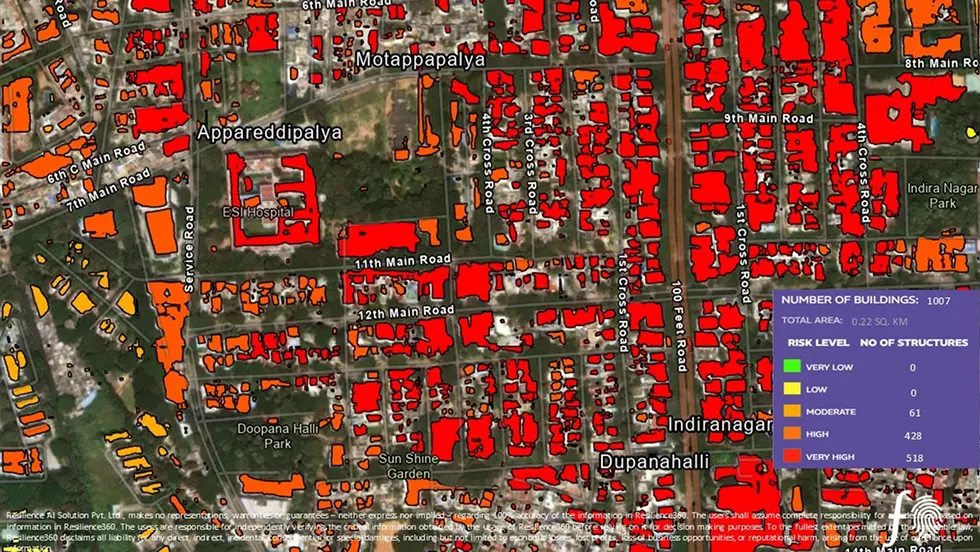Summers getting intense in Bengaluru: Is Your Office in a High-Heat Zone?

As summer approaches in India, it's no longer just cities like Delhi that experience the worst of it. This year, Bengaluru, historically known for its mild weather, is feeling the heat in unexpected ways. In fact, there are days when Bangalore’s temperatures are higher than those of Delhi. Last year was no different either for the startup and IT capital of India.
This shift is largely due to climate phenomena like La Niña and the growing influence of the urban heat island (UHI) effect
Urban Heat Island: A Growing Concern
Bengaluru’s rapid urbanization is contributing to a rise in temperatures that can affect everything from energy demand to employee productivity. The UHI effect occurs when urban areas, especially those with significant amounts of concrete, asphalt, and limited green cover, absorb and retain more heat than rural areas. Buildings, roads, and other built surfaces in high-density locations trap heat, exacerbating local temperature spikes.
As temperatures climb, office buildings are at risk of pushing the limits of their cooling systems. The higher the ambient temperature, the greater the strain on local power grids to meet the increased demand for cooling. This, in turn, raises the carbon footprint of cities and contributes to climate change. On a micro level, the impact on workplaces is equally concerning. Extreme heat can hinder employee concentration, reduce productivity, and even affect health and safety.
Is Your Office Location in a High Heat Zone?
Determining whether your office is located in a high-heat zone is crucial for mitigating these risks. While Bengaluru might not have been traditionally thought of as a city with extreme heat, this year’s patterns prove otherwise. Offices located in poorly ventilated areas with minimal green space are more likely to be impacted by the UHI effect.
With energy costs rising and the environmental cost of cooling becoming more apparent, it’s essential for businesses to explore energy-efficient cooling solutions that not only reduce the need for excessive air conditioning but also contribute to a more sustainable future.
Enter a Bengaluru ClimateTech Startup
In a time when climate change is a pressing issue, Resilience AI, a Bengaluru-based ClimateTech startup funded by Kalaari Capital and Java Capital is at the forefront of providing solutions to mitigate the impact of extreme heat on office environments in the city and beyond. Its suite of AI-driven solutions can help businesses navigate the following challenges:
- Microclimate Risk Assessment: By analyzing geoclimatic and built-environment parameters, it identifies which office zones are most at risk of extreme heat, helping businesses make informed decisions about office locations.
- Heat-Resilient Infrastructure Recommendations: It provides tailored suggestions for retrofitting office buildings with energy-efficient and cooling strategies like reflective materials, nature-based solutions (e.g., urban greening), and ventilated facades .
- Energy Efficiency Optimization: Its AI algorithms can provide insights to optimize energy consumption, helping reduce cooling loads and saving on energy bills while also cutting down on carbon emissions.
- Real-time Monitoring & Alerts: With its real-time monitoring system, businesses can stay ahead of extreme heat waves, ensuring that workplace safety and emergency preparedness measures are always in place .
- Policy & Compliance Guidance: Its solutions also include support for urban planners and businesses to align with regulatory standards and sustainable development strategies for heat adaptation.
“As Bangalore faces rising temperatures, it’s clear that businesses must address the growing heat risk in the workplace. By using AI-powered tools to assess, monitor, and mitigate the effects of extreme heat, companies can safeguard both their employees and their environmental footprint. By partnering with Resilience AI, businesses can ensure they are not only ready for the heat but are also contributing to a sustainable, cooler future,” says Samhita R, Co-founder and CEO, Resilience AI.
Resilience AI’s Heat Risk Assessment in Bengaluru
To better understand the impact of heat on urban infrastructure, Resilience AI ran a climate risk assessment for 1,007 structures in Bengaluru’s upscale Indiranagar neighbourhood. The assessment results highlighted varying levels of heat risk among the buildings surveyed:
- Structures in Moderate Risk: 61
- Structures in High Risk: 428
- Structures in Very High Risk: 518

These findings emphasize the significant heat-related risks faced by a large proportion of the city’s buildings. With more than half of the assessed structures falling into the high or very high-risk categories, it’s clear that proactive action is required to safeguard both the infrastructure and the people who occupy these spaces.
